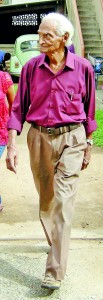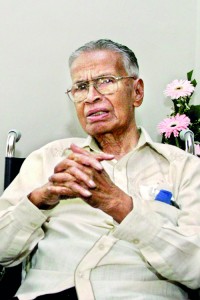Two men, two paths, both legends
One of the privileges of being a journalist is the chance we get to interact with people from all walks of life and have them share their lives’ experiences with us. In a week that saw the demise of two legendary Sri Lankans, namely Sam Wijesinha and Bala Tampoe, both of whom I had the good fortune of interviewing, it seemed fitting to write about the two gentlemen, who behind their public persona were unassuming, kind and eager to share the less known sides of their lives.

Bala Tampoe
Born one year apart, Wijesinha in 1921 and Tampoe in 1922, at a time when the country was in the final throes of breaking free from the shackles of nearly 500 years of colonial rule, their lives took radically different paths, but each left an indelible mark in his chosen area of work.
Sam Wijesinha who passed away last Sunday at the age of 93 whose illustrious career as Secretary General of Parliament and services as Ombudsman are well known, may have travelled the conventional route taken by many educated Ceylonese of the day but the fierce independence with which he handled his duties as a civil servant earned him the highest respect in his chosen sphere of work.
When I was asked to interview him to coincide with his 90th birthday in July 2011, I was determined to unearth some little known facts about the life of a man whose name at once conjures up images of a straight talking civil servant clad mostly in his impeccably pressed white suit with his hair combed back with a neat parting in the middle.
Seated in his favourite corner at his home ‘Lakmahal’ down Alfred House Gardens, what kicked off our conversation was the book that I saw lying on a stool close to where he we seated. It was Pride and Prejudice by Jane Austen and soon we were talking about his great admiration for the 18th Century British novelist.
Wijesinha had first read Pride and Prejudice for his matriculation examination way back in 1939. Since then he had read it many times over and developed an enduring fascination for the author and her words. His collection of Austen not only included all her books but also books written about her, movie versions of the books and audio books which he listened to on days he found it difficult to read. One of his prized possessions is the book written by Prof. Yasmine Gooneratne on Jane Austen which she presented to him on his 89th birthday.
Along with Austen, he was a great fan of Bollywood films with superstar Amitabh Bachchan being his favourite and found great pleasure in the music of French pianist Richard Clayderman .
Sam Wijesinha was born in the village of Gatamanne in the Hambantota District and finished his school education at S. Thomas College, Mount

Sam Wijesinha
Lavinia before entering the University College in 1941. Having passed out from the newly formed University of Ceylon with an honours degree in History, he went on to join the Ceylon Law College from where he passed out as an Advocate. In 1962, he was invited to join Parliament as an Assistant to the Clerk of the House who was Ralph Deraniyagala at the time. He succeeded Deraniyagala as Clerk of the House in 1964 and along with the Constitutional changes that followed, his position changed to that of Secretary of the National State Assembly in 1972 and Secretary General of Parliament in 1977, till his retirement in 1981.
During his years of service in Parliament, Sam Wijesinha won the confidence of members on both sides of the House. As he recalled during his interview with me, Bernard Soysa had quipped one day, “Sam, when you first came here your hair was parted to the side. Since then your impartiality is evidenced in the middle parting of your hair.”
Having served several years as the Chairman of the Dispute Resolution Council of the Press Complaints Commission of Sri Lanka, he was also a strong believer in the power of the media saying that if not for the presence of the large number of reporters in the Press Gallery in Parliament, not many MPs would bother to make their fiery speeches.
Bala Tampoe, the fiery trade union activist who died aged 92 on Tuesday was a rebel to the core and remained so even as an octogenarian when I met him in 2005. It was with a sense of glee he recalled going with a group of friends to watch a movie at the Majestic Cinema as a teenager. As the British national anthem “God Save the King” played before the feature film began, all had to rise. In a cinema packed with British servicemen, Bala Tampoe remained seated. A British serviceman hit him repeatedly with the beret that was in his hand but that did not break Tampoe’s defiance. Once the movie was over, an altercation took place between the Ceylonese boys and the Britishers but Bala Tampoe had made his point. He was no pushover as a teenager and he remained so till the day he died.
He was born Balendra Tampoe Phillips on May 23, 1922 in Negombo, his father an Excise officer in British India who lived along with his mother in Bangalore. She returned to Sri Lanka (then Ceylon) shortly before Bala was born and they lived here with his older sister till he turned three when they returned to India to join his father.
As with most other things in his life, how Balendra Tampoe Phillips became Bala Tampoe is also an interesting story. In British India there was a quota to get children admitted to English schools, where for every four British and Anglo Indian children, only one Indian child was admitted. Ceylonese were also considered Indian at the time.
His mother had sent in his application for admission to a leading English medium Anglican school in the name of B.T. Phillips and a few days later a letter arrived confirming his admission and asking him to come with the school fees to enrol as a student there. However when young Bala was ushered into the office of the Principal, an Englishman, the mother and son were told, “There is some mistake.” The reason he had been given admission was because it was presumed that he was English as his name in the application was B.T. Phillips – a name that did not reveal his nationality.
They returned to Ceylon soon afterwards and he was admitted to Royal College, Colombo in 1930 but this time his mother made sure that his application was made in the name of Balendra Tampoe Phillips in case there was a repetition of the earlier incident. This unsavoury episode prompted him to officially change his name to Bala Tampoe in 1944 after placing an advertisement in the paper.
Bala Tampoe, later known as Comrade Bala to thousands of Sri Lankans had his first brush with trade union activism in 1947; the year a general strike was organised by the General Clerical Services Union (GCSU) of which T.B. Illangaratne (later Cabinet Minister in several SLFP-led governments) was President. As a young man he stood on a podium close to the Dalada Maligawa in Kandy and made his first public speech in support of trade union and political rights for government servants, defying the powerful British rulers of the day. The strike collapsed a few days later, but there was no turning back for Bala Tampoe and his name became synonymous with the struggles of the working class in Sri Lanka.
On May Day 2014, days away from his 92nd birthday, he addressed the meeting organised by the Ceylon Mercantile Union (CMU) , the General Secretary of which he remained from 1948 till the time of his death.
While studying at the University of Ceylon, which he entered in 1939, Bala Tampoe addressed its Biological Society on a somewhat unusual topic: “Marxism and Biology”. His lecturer was so impressed he sent him a certificate stating, “He has a keen and critical mind and reads widely. He will go far.” It remained one of his most prized possessions. The master’s words were prophetic. He did go far, but chose the road less travelled, defying convention and staying true to the cause he embraced till the end.
Many words, no doubt will be written about these two illustrious sons of Sri Lanka and many quotations used to bid them farewell. These words by poet Henry Wadsworth Longfellow, for me, are an apt reminder of the inspiration that we can draw from the lives of these two great human beings. “Lives of great men all remind us, we can make our lives sublime, And, departing, leave behind us, Footprints on the sands of time”.
(See also Business Times and ST 2)


